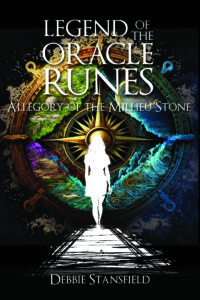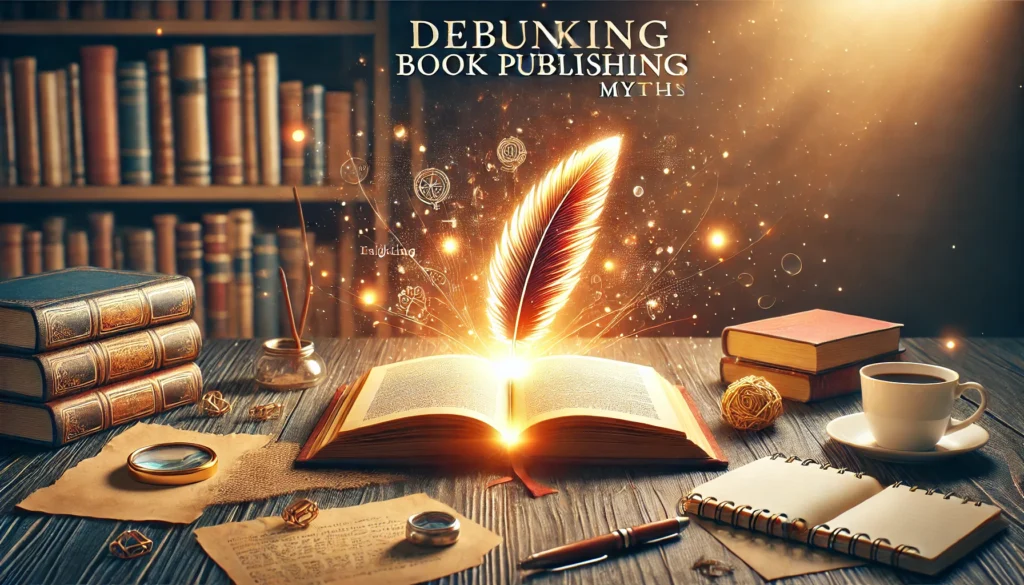
The world of publishing is often shrouded in mystery, misconceptions, and book publishing myths that can deter aspiring authors from pursuing their dreams. From fears about the daunting costs to the belief that self-publishing means subpar quality, these myths create unnecessary barriers for writers eager to share their stories with the world.
But the truth is far more empowering than the myths suggest. In this article, we’ll tackle the most common book publishing myths head-on, busting them wide open and revealing the reality of what it takes to get published. Whether you’re aiming for traditional publishing or exploring other publishing options, understanding the facts is the first step toward success.
Let’s clear the air and set the record straight—your journey to becoming a published author starts here!
Myth #1: Publishing My Book Will Make Me Rich
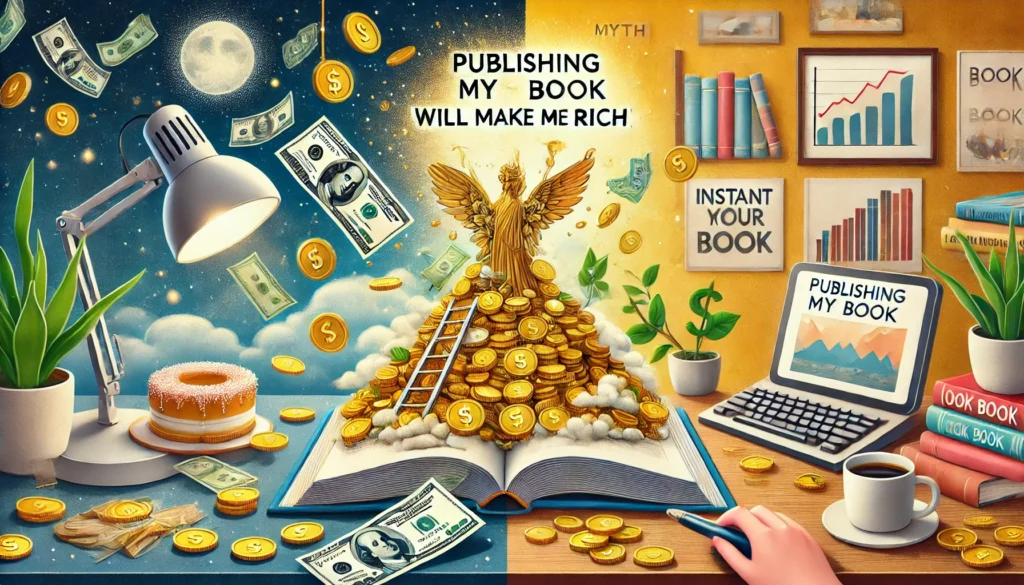
One of the most persistent book publishing myths is the idea that publishing your book will automatically lead to instant wealth. Many aspiring authors envision landing a publishing deal or releasing a self-published title and seeing their bank accounts overflow. Unfortunately, the reality is not that straightforward.
While some authors do achieve significant financial success, most writers earn modestly from their books. Income depends on various factors, such as marketing efforts, audience reach, publishing model, and royalties. Traditional publishing deals often involve an advance, but even that might not be as lucrative as people expect. Self- or vanity publishing, on the other hand, requires significant upfront effort and investment to generate consistent revenue.
It’s important to manage expectations and focus on the passion for storytelling rather than the promise of riches. Busting this book publishing myth allows aspiring authors to approach their publishing journey with realistic goals and a clear understanding of what it takes to succeed.
Myth #2: I Need an Agent to Get Published
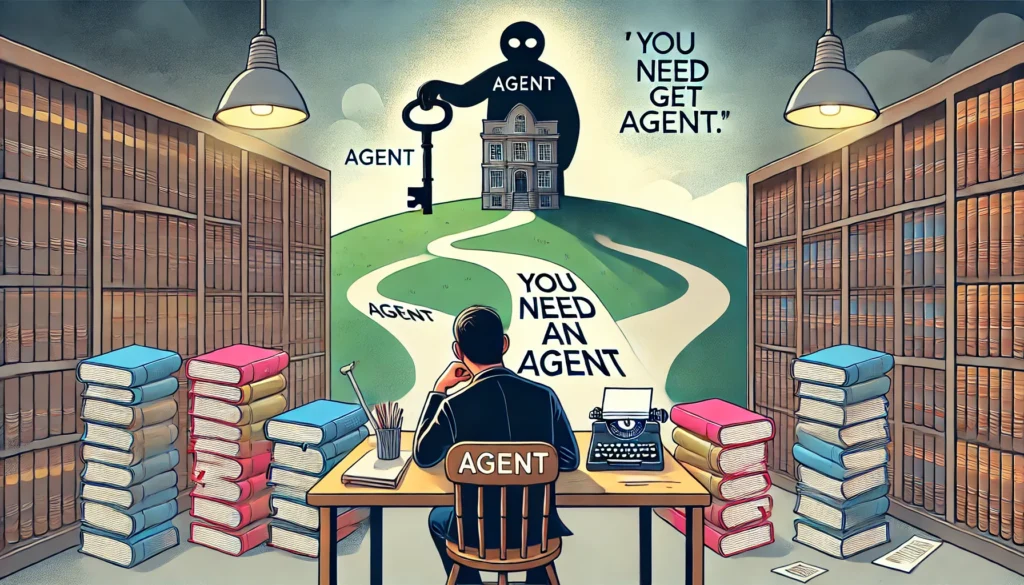
Another widely believed book publishing myth is that securing an agent is the only way to get published. While agents can play a crucial role in traditional publishing—helping authors navigate contracts and connect with top-tier publishers—they’re not an absolute necessity.
In today’s publishing landscape, authors have more pathways than ever to bring their work to readers. Self-publishing platforms like Amazon Kindle Direct Publishing (KDP) allow writers to bypass the need for an agent entirely. Independent publishers like Celenic Earth Publications also often accept direct submissions, enabling authors to submit their manuscripts without representation.
Moreover, some traditional publishers have open submission windows or contests where an agent isn’t required. Debunking this book publishing myth empowers authors to explore all their options and find the path that best suits their goals, whether that involves working with an agent or taking a more independent approach.
Myth #3: I Don’t Have to Pay to Publish My Book
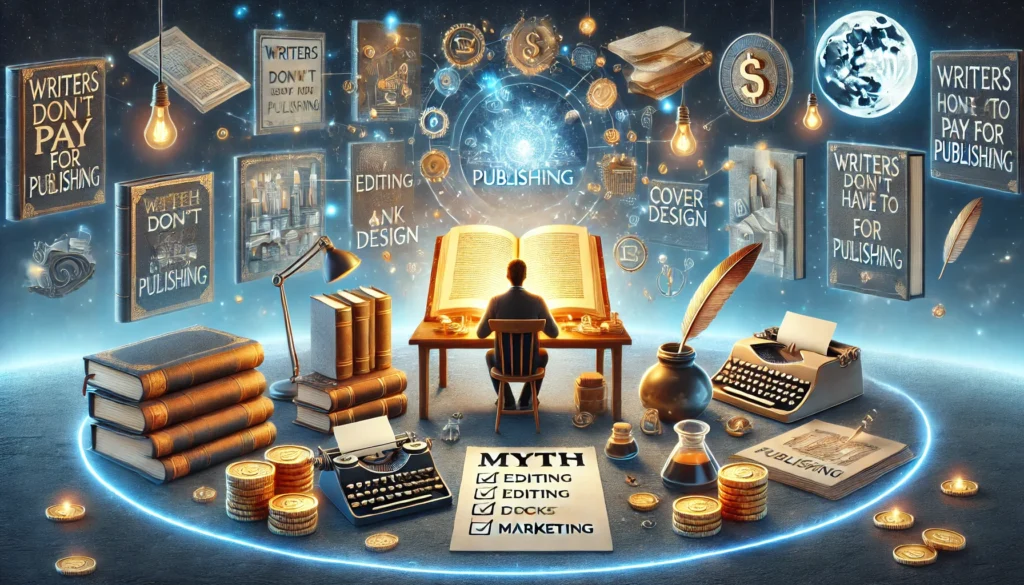
One of the most misleading book publishing myths is the notion that writers shouldn’t have to pay for publishing because their book is so good, it will make the publisher rich. This misconception often stems from a misunderstanding of how the publishing industry works, especially in the realm of self-publishing and hybrid models.
In traditional publishing, publishers invest in authors by covering costs like editing, cover design, and marketing, but this comes with a trade-off: a significant portion of royalties goes to the publisher, not the author. For self-publishing or hybrid models, the author often bears these upfront costs, as they are essentially acting as their own publisher or sharing the financial responsibility.
Publishing is a business, and even the best-written books require resources to bring them to market—editing, formatting, cover design, marketing, and distribution don’t come cheap. The myth that a stellar manuscript guarantees free publishing ignores the economic realities of the industry. Busting this book publishing myth ensures writers are prepared to invest in their work and understand the value of collaborating with professionals to make their book a success.
Myth #4: My Book Doesn’t Need Editing
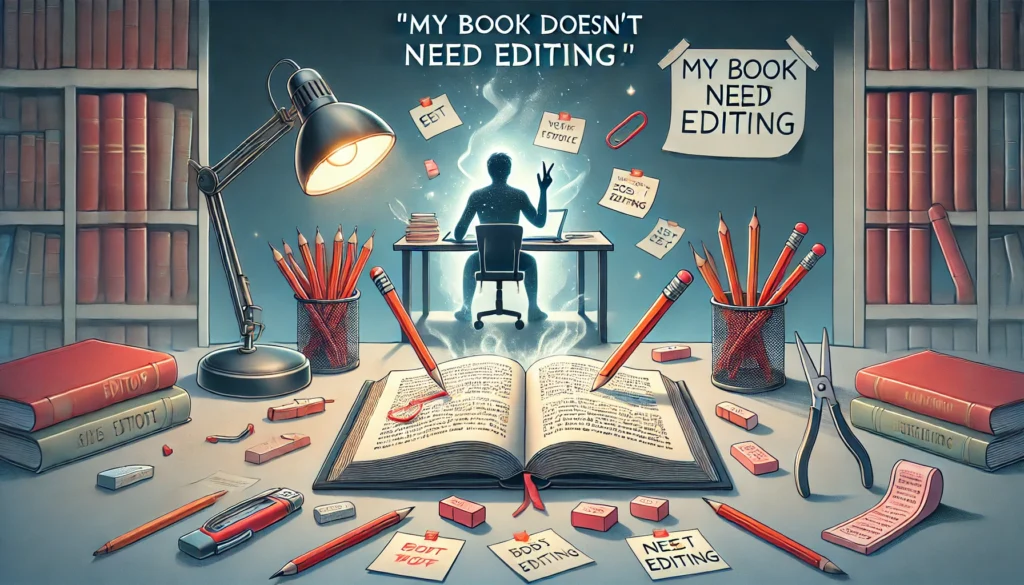
Among the most harmful book publishing myths is the belief that a manuscript doesn’t need editing, especially if it’s written by a skilled writer. Many authors assume their work is polished enough to skip the editing process, but even the most experienced writers benefit from professional editing.
Every book, regardless of the author’s expertise, requires a second pair of eyes to catch errors, refine the narrative, and ensure the text resonates with readers. Editing goes beyond simple grammar and spelling corrections—it involves improving structure, pacing, character development, and clarity.
Skipping editing can lead to negative reviews and a lack of credibility, potentially damaging an author’s reputation and sales. Busting this book publishing myth highlights the importance of collaborating with editors who can elevate a manuscript from good to exceptional, ensuring it’s truly ready for publication.
Myth #5: My Book Will Become an Instant Bestseller

One of the most alluring book publishing myths is the belief that publishing a book will instantly catapult it to bestseller status. Many authors dream of their work skyrocketing to fame as soon as it hits the shelves, but the reality is far more complex.
Becoming a bestseller requires more than just great writing—it involves strategic marketing, strong distribution channels, and often a significant amount of luck. The competition is fierce, with millions of books vying for attention across traditional and digital platforms. Even critically acclaimed books can take months or years to gain traction, and many never reach the bestseller lists.
This myth can lead to disappointment if authors enter the publishing world with unrealistic expectations. By debunking this book publishing myth, writers can focus on building their audience, engaging in consistent marketing efforts, and celebrating smaller milestones that pave the way to long-term success.
Myth #6: I Don’t Need to Help Market My Book
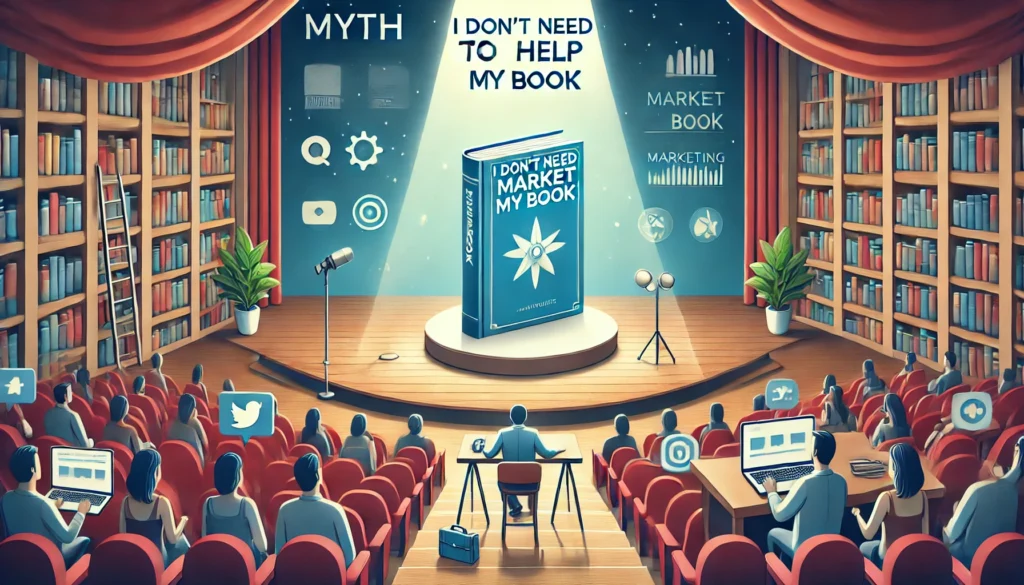
A persistent book publishing myth is the belief that marketing a book is solely the publisher’s responsibility, leaving authors free to focus only on writing. While publishers may have marketing teams and strategies in place, the author’s involvement is crucial to a book’s success.
Publishers, especially traditional ones, often allocate their marketing resources to a select few titles, meaning many books receive only minimal promotion. For self-published and hybrid authors, the responsibility for marketing falls almost entirely on their shoulders. Authors are often the best advocates for their books because they understand their audience and can bring a personal touch to promotional efforts.
Engaging with readers through social media, hosting book signings, creating email campaigns, and collaborating with influencers or book bloggers are just some of the ways authors can actively contribute to marketing. Debunking this book publishing myth empowers writers to take control of their book’s success by working hand-in-hand with publishers or taking charge of self-publishing ventures.
Myth #7: I Can’t Make a Living as a Writer
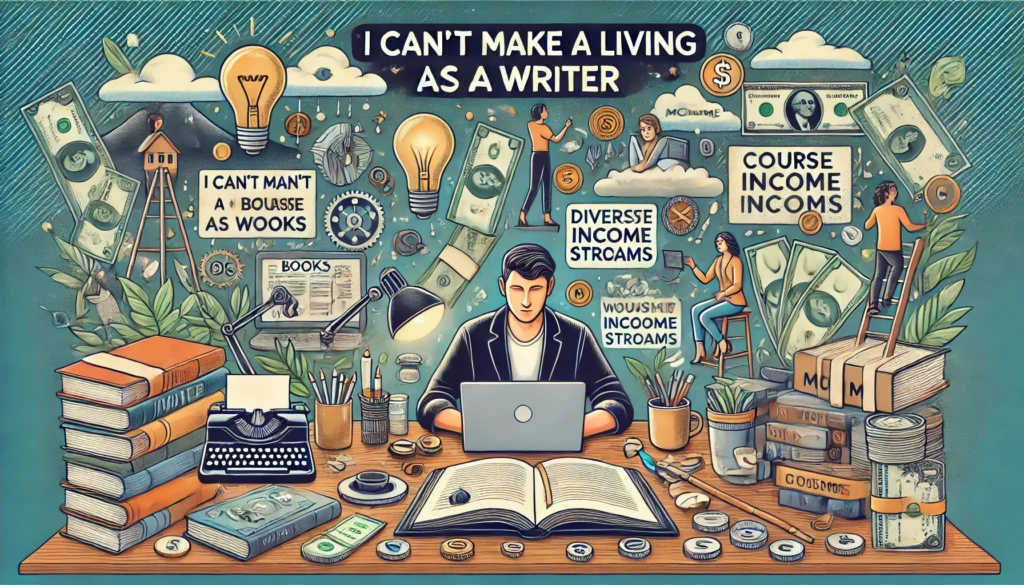
A deeply ingrained book publishing myth is the idea that writers can’t make a sustainable living from their craft. While it’s true that not every author becomes a millionaire, many writers successfully build careers by diversifying their income streams and leveraging their skills.
The modern publishing landscape offers more opportunities than ever. Writers can earn through multiple channels, such as book royalties, freelance writing, teaching writing workshops, creating online courses, offering editing or coaching services, and licensing their works for adaptations in film, TV, or games.
While the journey to financial stability as a writer requires effort, strategic planning, and perseverance, it’s far from impossible. By debunking this book publishing myth, aspiring authors can shift their mindset and explore the myriad possibilities available to turn their passion for writing into a viable career.
Debunking Common Book Publishing Myths
Understanding the realities of the publishing world is crucial for any aspiring author. The book publishing myths we’ve explored—about instant success, free publishing, or skipping essential processes like editing and marketing—can hold writers back if left unchecked.
By dispelling these misconceptions, you can approach your publishing journey with clarity, realistic expectations, and the tools to succeed. Whether you choose traditional publishing, self-publishing, or a hybrid route, remember that the key to success lies in preparation, persistence, and active engagement.If you’re ready to take the next step in your writing journey, check out the genres we’re currently accepting submissions for at Celenic Earth Publications. Let’s bring your story to life!







